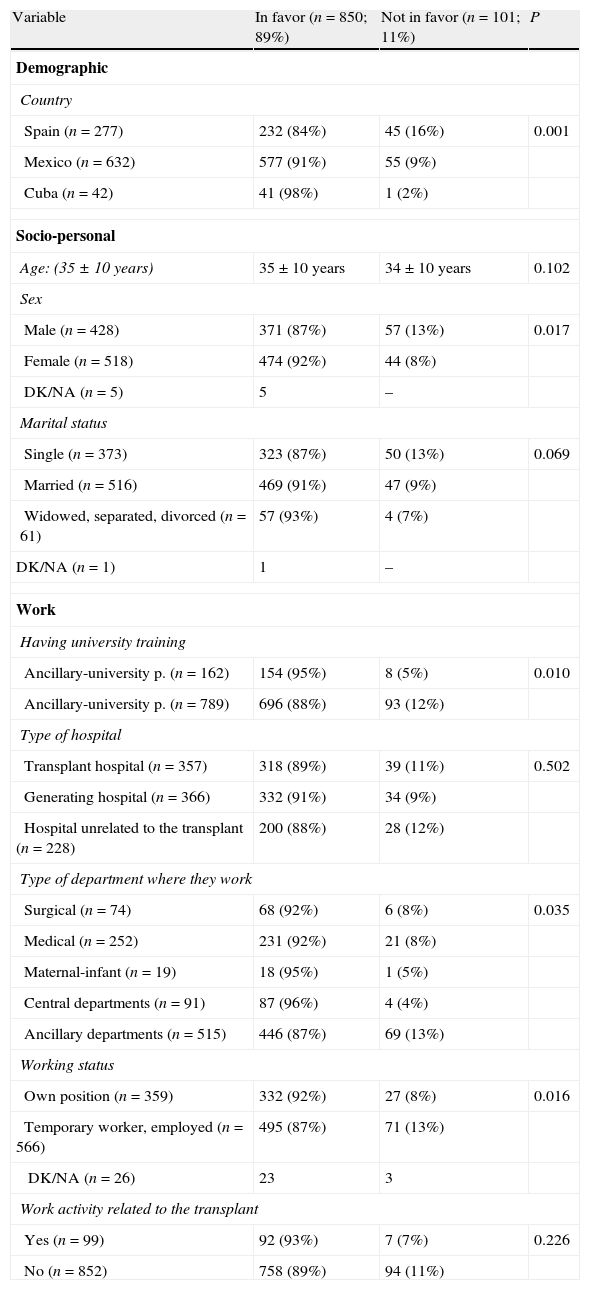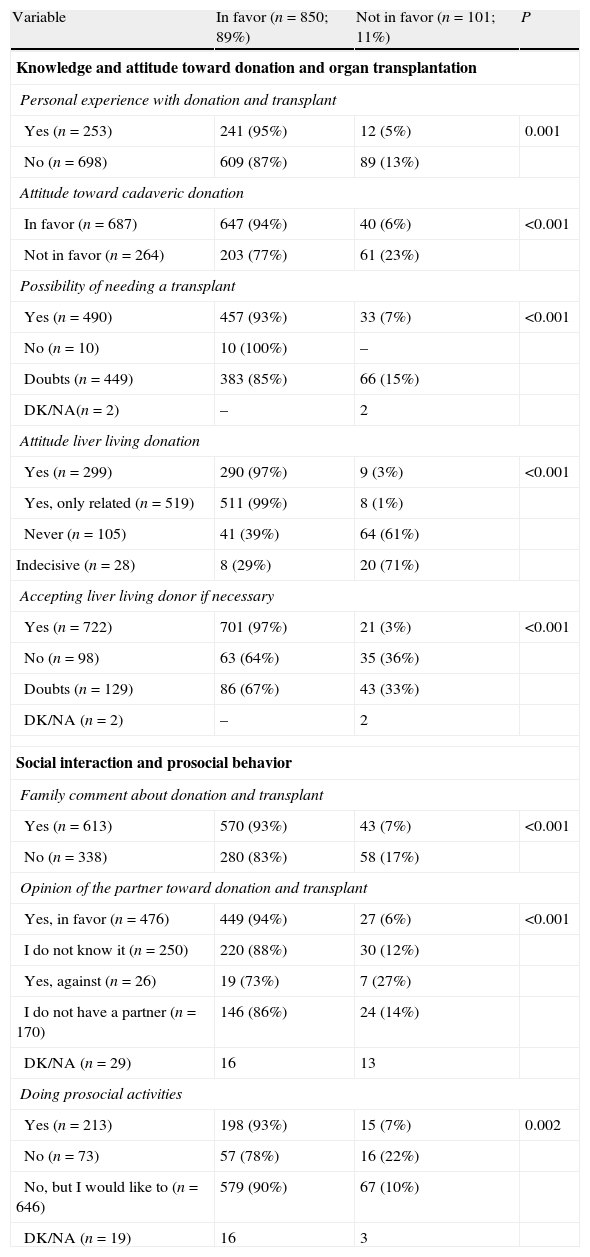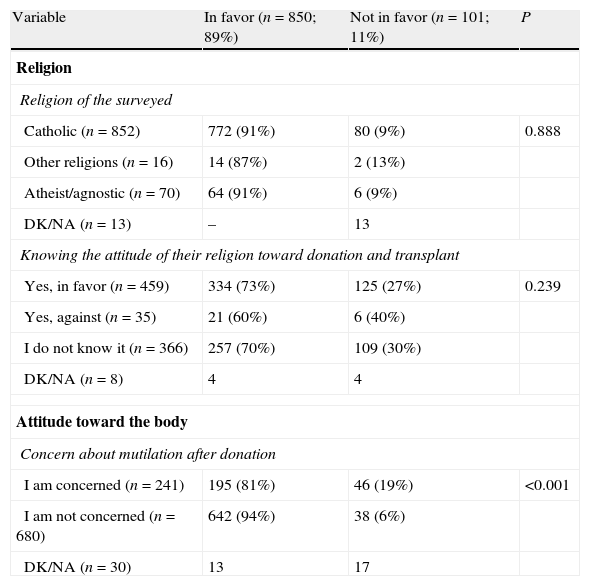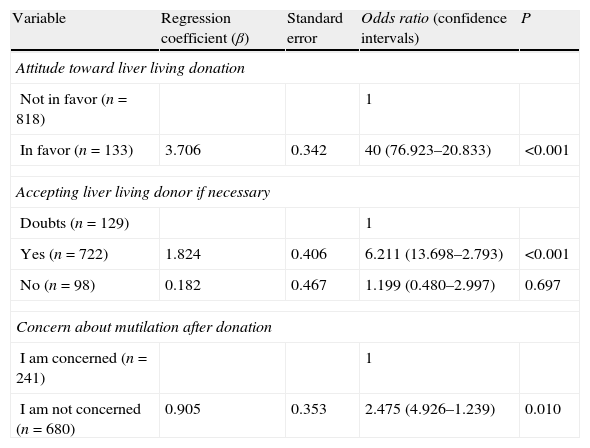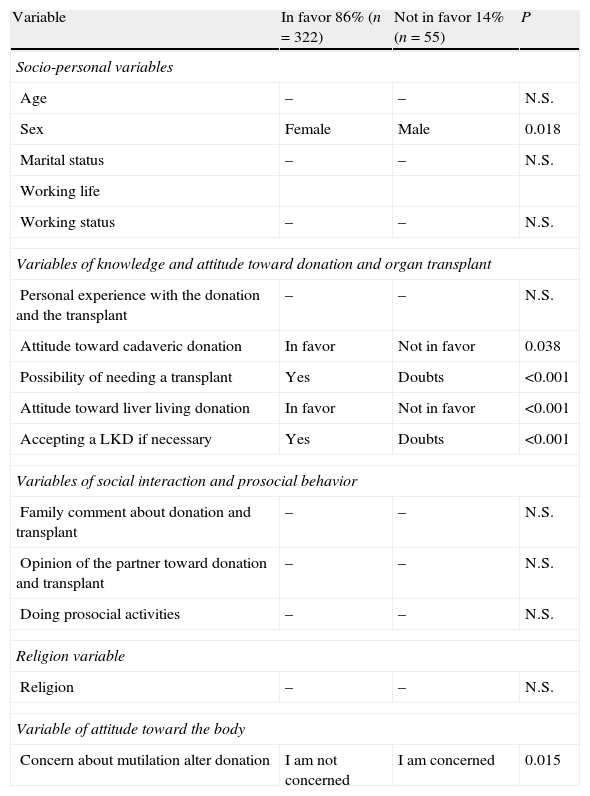Ancillary hospital personnel represent an important body of opinion because as they work in a hospital their opinion has more credibility for the general public as a result of their activity in hospitals. However, in most cases they do not have any health care training which means that their attitude could be based on a lack of knowledge or unfounded fears.
ObjectiveTo analyze the attitude toward living kidney donation (LKD) among ancillary personnel in Spanish and Latin-American hospitals and to analyze the variables that might influence such attitude.
Patients and methodfrom “International Collaborative Donor Project” a random sample was taken among ancillary personnel in Spain, Mexico and Cuba hospitals. Attitude toward LKD was evaluated using a validated, anonymously filled and self-administered survey.
Results951 professionals were surveyed (Spain: 277, Mexico: 632, Cuba: 42). 89% (n=850) are in favor of related kidney donation, lowering to 31% (n=289) in non-related donation. Of the rest, 8% (n=78) are not in favor and the 3% (n=23) are unsure. By country, Cubans (98%) and Mexicans (91%) are more in favor than Spanish (84%) (P=0.001). The following variables are related to favorable attitude toward LKD: female sex (P=0.017), university degree (P=0.010), work in health services (P=0.035), labor stability (P=0.016), personal experience in donation and transplantation (P=0.001), positive attitude toward cadaveric donation (P<0.001), belief that he or she might need a transplant in the future (P<0.001), positive attitude toward living liver donation (P<0.001), a willingness to receive a donated living liver if needed (P<0.001), having discussed the subject of organ donation and transplantation within the family (P<0.001), partner's positive attitude toward the subject (P<0.001), participation in voluntary type pro-social activities (P=0.002) and not being concerned about possible mutilation after donation (P<0.001)
ConclusionsThe attitude toward living related kidney donation is favorable among ancillary personnel in Spanish and Latin-American hospitals. Because living donation is a better source of organs than cadaveric ones, this favorable predisposition can be used as promoting agent of living donation in order to develop it in Spanish-speaking countries.
Los profesionales no sanitarios de centros hospitalarios son un grupo de opinión con credibilidad para la población, por el hecho de trabajar en un hospital. Sin embargo, no tienen preparación ni formación sanitaria en la mayoría de los casos, por lo que su actitud puede estar basada en el desconocimiento o miedos no fundados.
ObjetivoAnalizar la actitud hacia la donación renal de vivo (DVR) de los profesionales no sanitarios de centros hospitalarios españoles y latinoamericanos, y analizar las variables que influyen en dicha actitud.
Pacientes y métodoDel «Proyecto colaborativo internacional donante» se selecciona una muestra aleatoria entre el personal no sanitario de los distintos centros hospitalarios de España, México y Cuba. La actitud hacia la DVR se valoró mediante una encuesta validada, cumplimentada de forma anónima y autoadministrada.
ResultadosFueron encuestados 951 profesionales (277 de España, 632 de México y 42 de Cuba). El 89% (n=850) está a favor de la DVR relacionada, descendiendo hasta un 31% (n=298) cuando se trata de una donación no relacionada. Del resto el 8% (n=78) no está a favor y el 3% (n=23) está indeciso. Por país los cubanos (98%) y mexicanos (91%) tienen una actitud más favorable que los españoles (84%) (p=0,001). Dicha actitud favorable hacia la DVR se asocia con el sexo femenino (p=0,017), tener formación universitaria (p=0,010), trabajar en servicios sanitarios (p=0,035), tener estabilidad laboral (p=0,016), haber tenido experiencia personal con la donación y el trasplante (p=0,001), estar a favor de la donación de cadáver (p<0,001), considerar la posibilidad de necesitar un trasplante en el futuro (p<0,001), estar a favor de la donación de vivo hepática (p<0,001), aceptar un riñón procedente de donante vivo si fuese necesario (p<0,001), haber comentado con la familia sobre la donación y el trasplante (p<0,001), la actitud a favor de la pareja hacia el tema (p<0,001), el realizar actividades prosociales (p=0,002) y no preocuparle la posible mutilación del cuerpo tras la donación (p<0,001).
ConclusionesLa actitud hacia la DVR relacionada entre el personal no sanitario de centros hospitalarios españoles y latinoamericanos es favorable. Esta predisposición tan favorable de los profesionales hospitalarios puede ser utilizada como fuente de promoción de la donación de vivo, la cual supone una fuente potencial de órganos muy superior a la de cadáver que aún tenemos por desarrollar en nuestros países de habla hispana.





